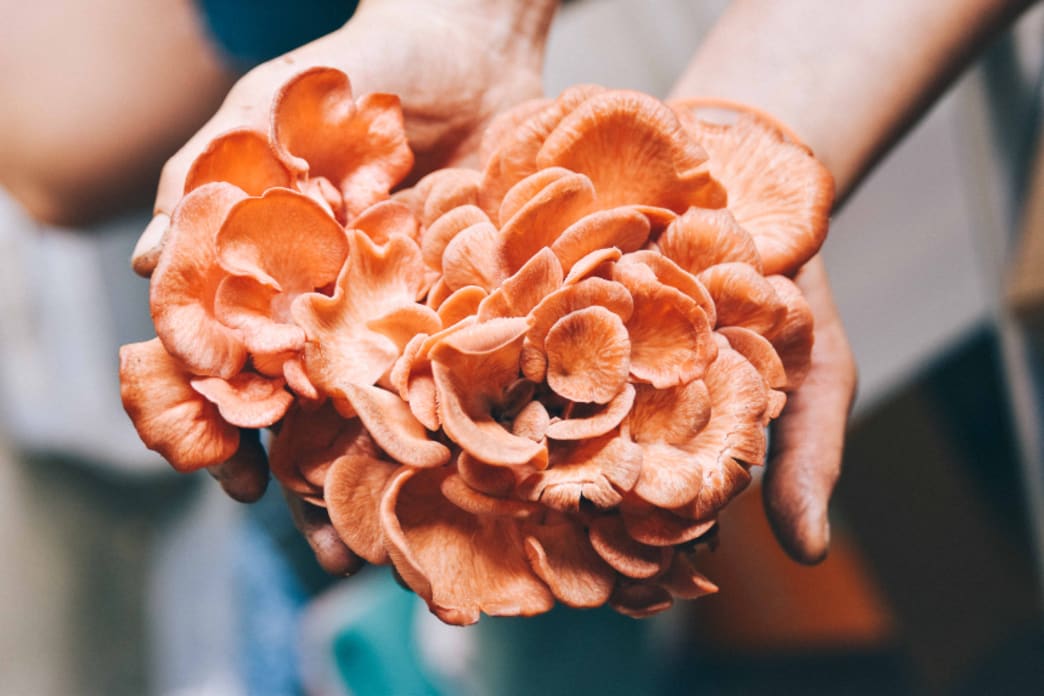Our mushroom definition looks at the fruiting body but also goes much deeper, to the mycelium and beyond
Mushrooms have so much to teach us beyond reusing waste streams and producing high quality food. They are also teachers of the connection all beings share, the importance of community, and the truth that nothing goes to waste.
The specialty mushroom industry is rapidly growing, and there are huge business opportunities in working with fungi. This should not supersede the deeper truths fungi have to teach. Hopefully as this industry expands it can do so with the values of community and connection.
Today we are looking at a mushroom definition so we can get a better understanding of what a mushroom is.
Mushroom definition: A fruiting body that can be seen by the naked eye and picked by hand
Mushroom-forming fungi are a subset of the fungi kingdom, and these likely number close to 140,000 species. About 20,000 species have been identified, of those only 200 species have been cultivated, with about 20 reaching large scale cultivation. There is plenty of room for discovery in the fields of taxonomy and cultivation when it comes to mushroom-producing fungi.
All mushrooms are fungi, but not all fungi are mushrooms! The word “mushroom” refers to the fruiting body of certain fungi that can be seen by the naked eye and picked by hand. Mushrooms can grow from many different substrates and occupy many different ecological niches. There are countless different shapes, colors, and morphological characteristics that mushrooms express. Many times mushrooms have a very short lifespan so they can be difficult to study in the field. A mushroom is only one piece of the larger fungal life cycle.
The main body of the organism is known as mycelium, which grows in multiple directions as it seeks food to digest. All fungi digest food in their environment with enzymes that are produced by the mycelium. Mycelium only has one cell wall so it is extremely sensitive to moisture loss. Because of this, to find mycelium in the wild you need to roll over logs or dig into the leaves where moisture content is higher.
Mycelium is what cultivators need to grow before fruiting mushrooms. Any good tomato grower knows they need to grow healthy plants to produce beautiful tomatoes. Likewise a mushroom farmer must cultivate healthy mycelium FIRST and then create a favorable environment for mushrooms to fruit.
When the environmental conditions are right, mycelium will form mushrooms. Some fungi are very particular in what they need to switch over from mycelial growth to producing a mushroom. The most commonly cultivated mushrooms do not require much to induce fruiting. The mushroom’s main role in the life cycle is to produce spores. Spores are similar to seeds in that they are the reproductive elements of the organism. They are microscopic packets of genetic material that are distributed by insects, rain, and wind to hopefully find a new food source. Spores are produced by mushrooms in the tens of thousands. In fact, every breath we take on this planet we inhale mushroom spores.
In the wild, the mushroom life cycle rotates between these 3 phases - mushroom, spore, mycelium - in a constant evolution of change and growth. Amazingly, mushroom tissue can revert to mycelial growth for many species of mushrooms. This is extremely useful for the cultivator as exact clones with the same DNA can be taken from mushroom tissue and further expanded. These clones from individual mushrooms are called strains.
Going beyond a mushroom definition
The best teachers for growing and working with fungi are the mushrooms themselves. A lot of learning to cultivate mushrooms is trying to grow them, watching what happens, and then adjusting accordingly. As with any farming venture, it is key to accept that you will have both successes and failures. Mushroom cultivation is a constant dance of observation and reaction.
The next best teacher is someone experienced with the process of success mushroom cultivation. If you are interested in learning how to grow mushrooms for your own food or as a commercial business, then we have some educational opportunities you should consider. First, we have an online course for home mushroom growers who want to grow up to 50 pounds of fresh mushrooms each week for their family and friends. This course teaches methods for growing multiple species of mushrooms indoors and outdoors. Learn more about the home growers course now.
For those interested in commercial mushroom cultivation, we also have an in-depth commercial course that addresses larger growing operations, how to develop an operational farm with missions and goals, ways to apply for grants and methods for establishing revenue streams. This course is perfect for anyone interested in starting a small-scale mushroom farm while avoiding many of the common errors. Learn more about the commercial mushroom cultivation course now.

